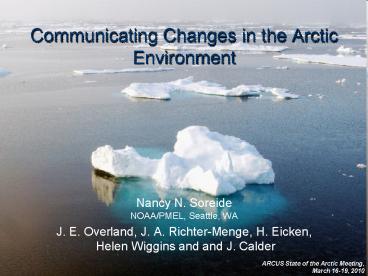Communicating Changes in the Arctic Environment - PowerPoint PPT Presentation
1 / 16
Title:
Communicating Changes in the Arctic Environment
Description:
Communicating Changes in the Arctic Environment Nancy N. Soreide NOAA/PMEL, Seattle, WA J. E. Overland, J. A. Richter-Menge, H. Eicken, Helen Wiggins and and J. Calder – PowerPoint PPT presentation
Number of Views:249
Avg rating:3.0/5.0
Title: Communicating Changes in the Arctic Environment
1
Communicating Changes in the Arctic Environment
- Nancy N. SoreideNOAA/PMEL, Seattle, WA
- J. E. Overland, J. A. Richter-Menge, H. Eicken,
Helen Wiggins and and J. Calder
ARCUS State of the Arctic Meeting, March 16-19,
2010
2
Communicating Changes in Arctic Environment
- The international Arctic Sea Ice Outlook
- A community-wide summary of the expected
September Arctic sea ice minimum. - The Arctic Report Card
- A concise, scientifically credible and accessible
source of information on recent changes in the
Arctic. - Future of Arctic Sea Ice and Global Impacts
- Summarizes important recent Arctic science
results for a broader broader audience, beyond
the science literature.
3
Sea Ice OutlookA community-wide summary of
expected September Arctic sea ice minimum.
- Reports issued monthly throughout summer.
- Synthesize community-wide estimates
- Scientific rationale of the range of estimates of
expected minimum of sea ice - Not formal predictions for Arctic sea ice extent
http//www.arcus.org/search/seaiceoutlook/
4
1996
1979-2000
2009
- All Outlook projected values for September 2009
were less than the observed value - But most were within the range of uncertainty
5
Sea Ice Extent
- Although there was more sea ice in September 2009
than in 2007 - The fall freezeup into November for 2009 matches
that of 2007.
6
The slow freezeup that was seen in satellite
observations of Arctic sea ice extent is also
seen in 2009 photos
Chukchi Sea, September 30, 2009
7
Arctic Report Card Tracks recent environmental
changesUpdated annually
http//www.arctic.noaa.gov/reportcard/
8
(No Transcript)
9
AtmosphereHigher air temperatures in the lower
Arctic atmosphere contributing to changes in the
atmospheric circulation in the Arctic and
northern mid-latitudes
AtmosphereLarge scale wind patterns impacted by
loss of summer sea ice
10
Sea Ice, Atmosphere, GreenlandConsistent
evidence of warming
11
Biology, Ocean and LandShow many indications of
warming
BiologyHigh Arctic species impacted by loss of
sea ice
12
Future of Arctic Sea Ice and Global
ImpactsSummarizes important recent Arctic
science results for a broader audience
- References
- 1 Wang, M., and J.E. Overland (2009) A sea ice
free summer Arctic within 30 years? Geophys. Res.
Lett., 36, L07502, doi 10.1029/2009GL037820. - 2 Overland, J.E., and M. Wang (2010) Large-scale
atmospheric circulation changes associated with
the recent loss of Arctic sea ice. Tellus, 62A,
19. - 3Honda, M., J. Inoue, and S. Yamane (2009)
Influence of low Arctic sea-ice minima on
anomalously cold Eurasian winters. Geophys. Res.
Lett., 36, L08707, doi10.1029/2008GL037079. - 4Strey, S.T., W. Chapman, and J. Walsh (2009)
Effects Of An Extreme Arctic Sea Ice Minimum On
the Northern Hemisphere Atmosphere During Late
Autumn and Early Winter, Eos Trans. Eos Trans.
AGU, 90(52), Fall Meet. Suppl., Abstract
C41A-0421. - 5 Schweiger, A.J., Lindsay, R.W., Vavrus, S., and
J.A. Francis (2008) Relationships between Arctic
sea ice and clouds during autumn. J. Climate, 21,
47994810. - 6 Serreze, M.C., Barrett, A.P., Stroeve, J.C.,
Kindig, D.N., and M.M. Holland (2009) The
emergence of surface-based Arctic amplification.
The Cryosphere, 3, 1119. - 7 Holland, M.M., C.M. Bitz, and B. Tremblay
(2006) Future abrupt reductions in the summer
Arctic sea ice. Geophys. Res. Lett., 33,
L23503,doi10.1029/2006GL028024. - 8 Budikova, D. (2009) Role of Arctic sea ice in
global atmospheric circulation A review. Global
Planet. Change, 68(3), 149163.
http//www.arctic.noaa.gov/future/
13
(No Transcript)
14
(No Transcript)
15
(No Transcript)
16
Arctic Report Card2http//www.arctic.noaa.gov/rep
ortcard/
International Arctic Sea Ice Outlook1
http//www.arcus.org/search/seaiceoutlook/
- A community-wide summary of the expected
September Arctic sea ice minimum. - Reports are released monthly throughout the
summer.
- Scientifically credible, annually-updated website
designed for managers, scientists and citizens - Peer-reviewed by topical experts of the Climate
Experts Group (AMAP) of the Arctic Council.
The Future of Arctic Sea Ice and Global
Impacts2http//www.arctic.noaa.gov/future/
- Summarizes important recent Arctic science
results for a broader broader audience
1 Supported in part through the National Science
Foundation (NSF) and the National Oceanic and
Atmospheric Administration (NOAA) 2 Supported by
the NOAA Climate Program Office through the
Arctic Research Program





![Download [PDF] Norse Greenland: Viking Peasants in the Arctic PowerPoint PPT Presentation](https://s3.amazonaws.com/images.powershow.com/10120711.th0.jpg?_=20240905036)

























